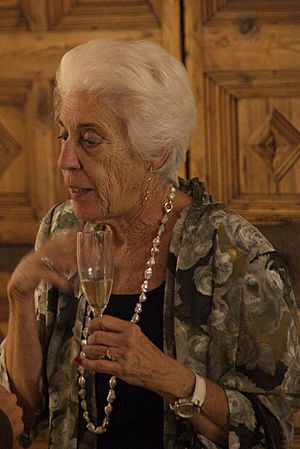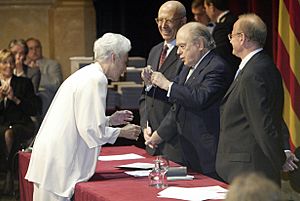Josefina Castellví facts for kids
Quick facts for kids
Josefina Castellví
|
|
|---|---|

Castellví in 2014
|
|
| Born |
Josefina Castellví Piulachs
1 July 1935 Barcelona, Spain
|
| Died | 2 February 2026 (aged 90) |
| Alma mater | University of Barcelona |
| Awards | Creu de Sant Jordi Award |
| Scientific career | |
| Fields | Oceanography |
Josefina Castellví Piulachs (born 1 July 1935 – died 2 February 2026) was a pioneering Spanish oceanographer, biologist, and writer. She was celebrated for her important work in understanding the oceans and the frozen continent of Antarctica. A peak on Livingston Island in Antarctica, called Castellvi Peak, was named in her honor.
In 1984, Josefina Castellví became the first Spaniard to join an international expedition to Antarctica. She earned her bachelor's degree in 1957 and a PhD in biological sciences from the University of Barcelona in 1969. From 1960, she worked at the Institut de Ciències del Mar (Institute of Marine Sciences) in Barcelona, dedicating her life to scientific research. She also contributed to the Spanish National Research Council (CSIC).
Josefina Castellví played a key role in organizing research in Antarctica. She helped set up the Juan Carlos I Antarctic Base on Livingston Island. She was the lead oceanographer at this base from 1989 to 1997. She also directed Spain's National Program of Antarctic Research from 1989 to 1995. Her dedication earned her many awards, including the Gold Medal of the Generalitat of Catalonia in 1994 and the Creu de Sant Jordi Award in 2003.
Contents
A Life of Discovery: Josefina Castellví
Early Life and Education
Josefina Castellví was born in Barcelona, Spain, on July 1, 1935. She grew up in a challenging time in her country's history. Despite this, she pursued her passion for learning. She attended the Montserrat Institute and later the University of Barcelona.
In 1957, at the age of 22, Josefina graduated with a degree in biology. She was one of only two people to complete the degree that year. Her thirst for knowledge led her to continue her studies. In 1960, she traveled to France to specialize in oceanography at the Sorbonne. By 1969, she had earned her doctorate in science from the University of Barcelona.
Pioneering Antarctic Research
After completing her studies, Josefina Castellví began her career as an oceanographer. In 1960, she started working at the Institute of Marine Sciences. She also took part in her first oceanographic expeditions on French ships. At that time, Spain did not have its own research vessels. This meant scientists like Josefina often had to conduct their early experiments in laboratories.
However, things changed in 1971 when Spain acquired its first oceanographic vessel. This allowed Josefina to study marine life directly in the ocean. She could then analyze how organisms behaved in their natural environment.
Leading the Juan Carlos I Base
A major highlight of Josefina Castellví's career was her work in Antarctica. In 1984, she made history as the first Spanish woman to join an international expedition to the icy continent. Her research contributions were vital.
In 1987, Josefina, along with Antoni Ballester and other scientists, established Spain's first research base in Antarctica. They named it the Juan Carlos I Base, located on Livingston Island. This achievement was very important for Spain. It allowed the country to become a member of the Antarctic Treaty System in 1988.
From 1989 to 1993, Josefina Castellví served as the chief director of the Juan Carlos I Antarctic Base. She was 52 years old when she took on this leadership role. She managed a team of 12 people who lived and worked at the base for four months each year. She described Antarctica as a "natural laboratory." She believed that the deep ice held billions of years of Earth's history, offering incredible insights into our planet.
A Passion for the Oceans
After her time leading the Antarctic program in Madrid, Josefina Castellví returned to Barcelona in 1995. There, she became the director of the Institute of Marine Sciences of the CSIC. Throughout her career, she combined her research with sharing her discoveries. She gave many talks and wrote books to educate others about the oceans and Antarctica.
Even after officially retiring in 2000, Josefina Castellví remained very active. She continued to work with the Advisory Council for Sustainable Development of Catalonia. She also kept giving lectures about her experiences in Antarctica. She emphasized the importance of this frozen desert for studying how living things adapt to extreme conditions. She explained that organisms must change to survive, or they will disappear.
Books and Documentaries
Her Published Works
Josefina Castellví was a prolific writer. She authored more than 70 scientific articles in national and international magazines. She also wrote several books, sharing her knowledge and experiences with a wider audience.
One of her notable books was Yo he vivido en la Antártida (I Have Lived in Antarctica), published in 1996. In this autobiographical work, she shared her personal journey and experiences. She described what it was like to direct the Spanish Antarctic base for four seasons. The book also included many interesting stories from her time on the continent.
Another important book was El Paper que juguen els oceans en l'equilibri del planeta Terra (The Role the Oceans Play in the Earth's Balance), published in 2005. This work discussed the effects of climate change and how environmental conditions on Earth have changed over time.
"The Ice Memories" Documentary
In 2014, a documentary film called "The Ice Memories" (Los recuerdos del hielo) was released. It celebrated Josefina Castellví's incredible journey. At 77 years old, she returned to Antarctica after more than a decade away. The film followed her farewell trip to the white continent.
The documentary honored the work of Josefina and three other scientists. They were Agustí Julià, Joan Rovira, and Antoni Ballester. Together, they helped Spain establish its first base in Antarctica. The film showed how Josefina took over leadership of the small facility after Dr. Antoni Ballester became ill. This made her the first female head of a research station in the history of international Antarctic research. The documentary was first shown on Spanish television in May 2014.
Awards and Legacy
Josefina Castellví received many awards and honors throughout her life. These recognitions celebrated her outstanding contributions to science and her pioneering spirit.
Some of her most significant awards included:
- The Gold Medal of the Generalitat of Catalonia (1994)
- The Narcís Monturiol Medal for Scientific and Technological Merit (1996)
- The Spanish Geographic Society's National Prize (1998)
- The Creu de Sant Jordi Award (2003)
- The Catalan of the Year Award (2013)
- The August Pi i Sunyer Medal from the University of Barcelona (2015), making her the first woman to receive this medal.
Josefina Castellví was a true inspiration. She was the first Catalan and Spanish female oceanographer. She showed that with dedication and hard work, anyone can achieve great things. She passed away on February 2, 2026, at the age of 90, leaving behind a remarkable legacy of discovery and leadership.
See also
 In Spanish: Josefina Castellví para niños
In Spanish: Josefina Castellví para niños
 | John T. Biggers |
 | Thomas Blackshear |
 | Mark Bradford |
 | Beverly Buchanan |


